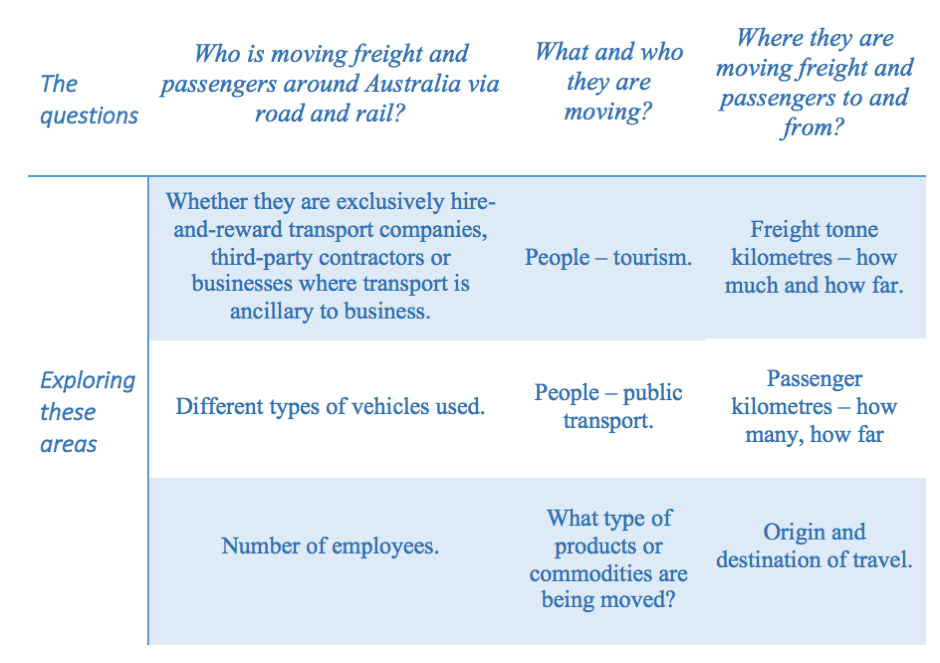What you need to know about this current NTC project and how it could positively impact supply chain management in Australia.
The NTC (National Transport Commission) is Australia’s independent statutory body that develops regulatory and operational reform of intermodal, road and rail transport, to contribute to the achievement of national transport policy. The NTC runs numerous projects simultaneously, however, what we are interested in today is the project: ‘Who moves what where’. This project released an information paper in September 2016, which can be found here.
This report is filled with graphs, tables and infographics all about freight and passenger transport in Australia. If you are in the logistics business (or generally interested) and have not seen it yet, it is certainly worth a look! Below is a table of the questions and key areas that the ‘Who moves what where’ information paper covers.
About NTC Discussion Paper
In January 2017, the NTC released a discussion paper titled ‘Who moves what where: Better informing transport planning for Australians’. This discussion paper analysed the September 2016 information to identify information gaps (areas where data was not available or too hard to collect).
The official abstract of the NTC January discussion paper is as follows: “[the paper] proposes recommendations to fill identified information gaps and provides opportunities to improve data collection and sharing to benefit planning for transport and related areas in Australia.”
The NTC is seeking stakeholder contributions and feedback to help finalise the recommendations and adjust them where possible. The NTC discussion paper stated that “recommendations from this project will be presented to ministers in the second half of 2017. [The transport ministers will use the recommendations to] better inform and equip Australia’s transport planning decision-makers.”
One of the limitations of the 2016 information paper was not being able to find sufficient information across several areas. These areas have been identified as information gaps that were referred to in the discussion paper. Below is the list of the information gaps acknowledged in the NTC discussion paper.
- Number of employees per fleet involved in road freight
- Number of ancillary versus hire-and-reward vehicles involved in road freight
- Commodities moved on the rail freight network
- Freight rail network utilisation
- The fleet profile for tourist rail operators
- Tourist rail usage, and
- Passenger rail network utilisation.

Recommendation areas
Two of the main recommendation areas outlined in the discussion report are: “improving data quality and encouraging a data culture across government and industry and filling the specific information gaps”. The volume of data being generated is drastically increasing and with it the opportunity to use data to improve our lives. There is a pressing need to better understand how to use data.
As transport and logistic industries are some of the key contributors to the Australian economy, it is essential that these industries are not left behind in the age of data. Thus, the report about changing the way data is collected and shared. Open data policies are becoming more and more important.
Open data policies
Open data policies can vary significantly. In Australia, there are a lot of different open data policies at play (and we are only gaining more!). Besides the Northern Territory, all other states and territories have their own policies regarding open data sharing. Even the different transport agencies within each state and territory have their own varied open data strategies.
Benefits to supply chain management
The whole premise of this paper is data, specifically open sourced data. The benefits of open sourced data are numerous and significant. For supply chain management, the more data that is made open source, easy to access and free where possible, the more informed decisions logistic incorporated businesses can make! Understanding what the most popular transport routes are, type of cargo transported, where the traffic will be, the average weight of land freight transport etc. The list goes on. The more information made available the more information there is to work with, to include when making those key decisions.
For any of your National or International freight requirements, contact your local S.A.L. Global Logistics representative.
Or, simply call us on 1300 714 743, or e-mail: sales@salglobal.com.au